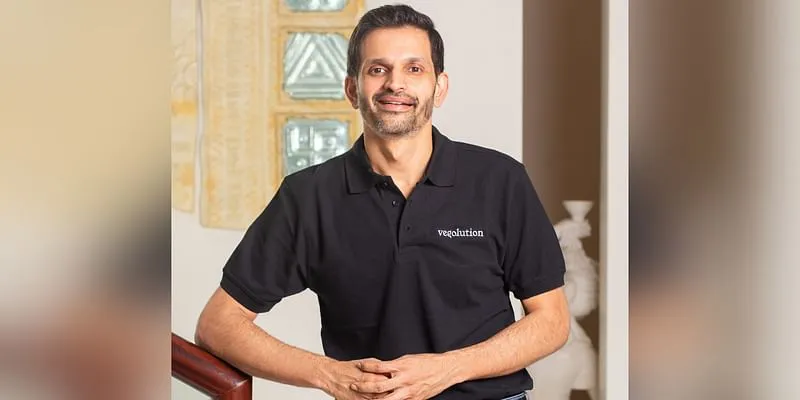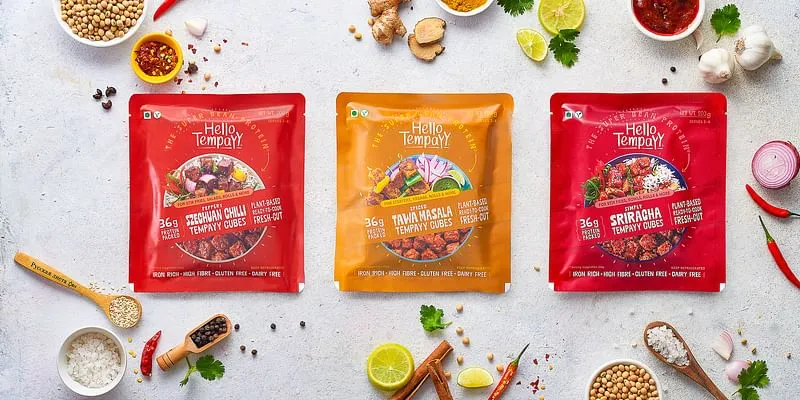How Hello Tempayy is reinventing a centuries-old food as a healthier alternative for vegetarians
Launched in 2021 under Bengaluru-based nutrition startup Vegolution, Hello Tempayy is a plant-based protein-rich offering made by fermenting non-GMO soybeans, and aims to make vegetarian food more nutritious.
India has a significant number of vegetarians. As per surveys cited by Food and Agricultural Organisation and USDA, around 40 percent of India’s population is vegetarian, numbering approximately 400 million – the highest in the world.
With the onset of the COVID-19 pandemic last year, many people – including vegetarians – are on the lookout for healthier alternatives to consume. This is a trend that Bengaluru-based nutrition startup Vegolution recognised.
“We saw this as an increasing trend and one that is expected to grow over the next decade,” Siddharth Ramasubramanian, Founder and CEO, tells YSWeekender.
As per a 2018 study by the Indian Dietetic Association, at least 84 percent of Indians are protein deficient, which leads to associated health conditions such as greater risk of bone fractures, stunted growth in children, and low immunity to infections.

Siddharth Ramasubramanian, CEO and Founder, Vegolution
“The leading indicator for us was the requirement of more protein in their diet. While they were seeking more proteins, they were seeking other ingredients as well – low carbs, low saturated fat, more Vitamin B12, iron, etc,” he adds.
This is what led him to start Vegolution in 2019, which is aimed at breaking the monotony of food choices for vegetarians and bridge the protein gap for Indian consumers. In March this year, the startup came out with – a plant-based protein-rich offering that is made by fermenting non-GMO (genetically modified) soybeans.
It is based on Tempeh, which is a traditional Javanese food whose origins in Indonesia can be traced back to at least the 12th century.
From casinos to nutrition
Siddharth has over two decades of experience in the fields of global hospitality and real estate. With a Bachelor of Science degree in Hotel, Restaurant, and Travel from the University of Massachusetts in Amherst, USA, Siddharth went on to pursue a Master’s degree in Management Hospitality from Cornell University, USA. He began his career with Boyd Gaming and MGM Mirage as the Director of Development of the billion-dollar Borgata Hotel Casino and Spa in Atlantic City, New Jersey, USA.
In 2003, he opened the first casino in Atlantic City in 13 years.
After a stint in Los Angeles, he became the Managing Director at one of Australia’s leading full-service casinos, and then relocated to Dubai. In 2017, he established the boutique advisory firm Harth Consulting that specialises in the conceptualisation, strategy, and execution of effective brand and business strategies across consumer businesses.
Addressing nutrition through food
As per BCG and McKinsey estimates, about 35-45 million households in India earn over Rs 1 lakh per month – translating to 120-150 million adults. Siddharth says that this, combined with the addressable audience of around 400 million vegetarians, enabled the team to look at addressing their source of nutrition.
“The reason we chose Hello Tempayy was that we consciously chose not to address the gap via supplements because they’re meant to supplement the nutrition. We felt the main gap was on the food plate – that’s where consumers were lacking choice,” he adds.
The team also decided not to enter the plant-based meat space as they wanted to deliver super-packed nutrition to a vast majority of the population.
They are also targeting casual non-vegetarians whose majority of the meals are vegetarian.

How Hello Tempayy is different?
Siddharth says that Hello Tempayy is only made of three ingredients – soybean, water, and a fermentation culture. The product has no added preservatives.
The product is made in a block, which is then cut into cubes.
“Unlike paneer or tofu which coats products and doesn’t absorb the flavour – as soon as you bite into them, they’re white on the inside. Tempayy is a clean label product that soaks in flavour and enhances the product,” Siddharth explains.
Because of the flavour absorption, the product can be marinated and create seasonings. Hello Tempayy is available in four variants – Natural, Simply Sriracha, Szechuan Chilli, and Spiced Tawa Masala.
The products are priced between Rs 130-Rs 150 for 200 grams.
The only other tempeh brand that sells in Bengaluru and pan India is TempehWala, meanwhile Tempedimumbai delivers in and around Mumbai.
A healthier alternative
Siddharth claims that Hello Tempayy can be used as a healthier alternative to conventional vegetarian sources of food such as tofu and paneer.
“It has 10 times less fat than paneer – 1.4 grams per 100 grams. When you look at soy chunks, though they have an extremely high protein content, they have an extremely high carbohydrate content as well,” he explains.
He says the product is fortified with Vitamin B12 and iron as a large Indian populace has B12 and iron deficiency.
“For 100 grams of our product, you get 50 percent Vitamin B12 requirement of the day, and 35 percent of iron,” he claims.

Gauging the response and future plans
The brand was first launched in Bengaluru in March 2021, and is currently available on its website as well as a few ecommerce platforms and retail stores.
Siddharth says the team saw an instant response in sales from vegetarians, vegans, and casual non-vegetarians – signalling a visible gap in the demand and requirement for more choices. This response is coming from home cooks, active fitness seekers, and family nourishers – mothers.
“Also, having marinated flavour has helped in its adoption as it makes it easier to cook for the first time,” he adds.
The brand plans to operate in the B2C space, as well as introduce Tempayy as a snacking option. It also has a partnership with Hyderabad-based Urban Kisaan – which is involved in vertical farming and offers nutrient-rich farm bows – as their protein choice. The brand has also partnered with GrowFin, a cloud kitchen, and is in talks with other cloud kitchens.
The brand is also in talks with Indian, Asian, and Continental restaurants that are looking for healthier ingredients for their dishes and more vegetarian options for their menu.
The brand is currently selling in Bengaluru, Mysuru, and Hyderabad, and plans to grow into five cities before the end of the year.
Edited by Megha Reddy











